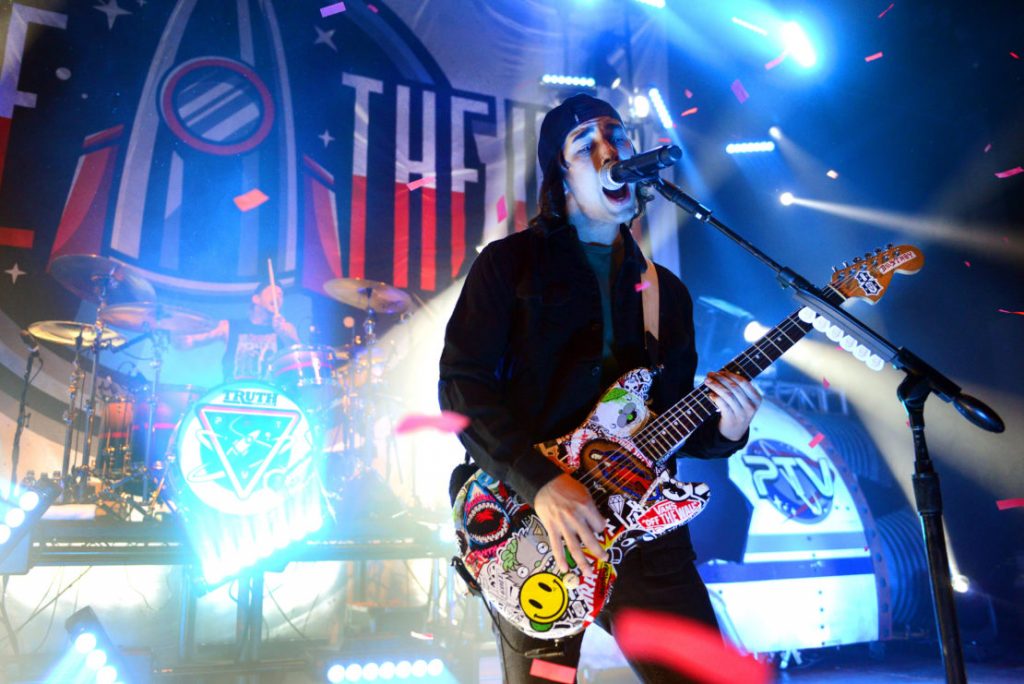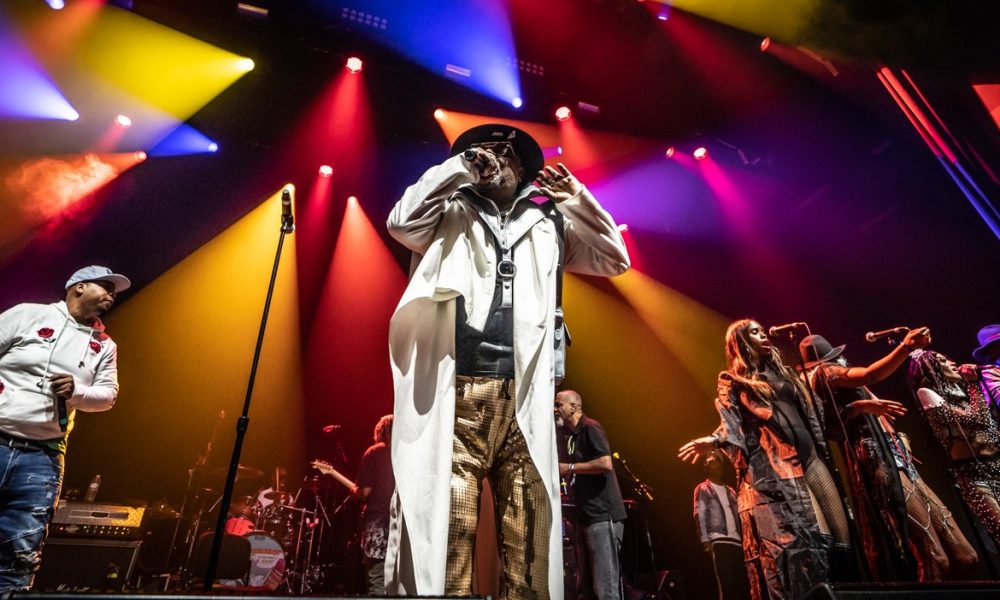The pop-punk scene of the late 2000s to early 2010s was a time that almost anyone in college now can remember with general disgust and an occasional fit of nostalgia. This general feeling is one that, for the past three years now, I’ve felt and understood on a personal level, having been a part of that scene quite heavily in my “youth.” From miles away anyone could have understood that my favorite bands consisted of classics such as Pierce the Veil and Bring Me the Horizon, that my favorite color was b l a c k, and that my “not like the other girls” attitude towards girls my age was just a thinly veiled denial of my own bisexuality. If I was any paler and bland, I would have been the poster girl for how that whole scene was back then: insecure, internally misogynistic, and a pendulum going from lacking self-awareness to being all too aware of everyone even facing your general direction for a second.
Yet, while I have looked back on that time as cringey and formative, lately I’ve been realizing how predatory the scene was at the height of its popularity. Being a teenage girl in the pop-punk scene was such a dangerous thing, and for the longest time I refused to acknowledge what that entailed for so many other girls like me. This behavior came from different factions: hearsay of your favorite band members “possibly” doing some lascivious shit to seeing girls just a couple of years older than you that are still in high school flirting with the band merch guy at a show.
From what I can remember, I began to notice all of this when my old best friend from middle school began to joke about how the guy from Blood On The Dance Floor was a “nasty man-whore” and kept getting in trouble for it on the internet while touring. Jokes were made about how the girls he slept with were so desperate for attention that they’d even sleep with a gross-looking dude like him. We didn’t acknowledge how these girls were just a couple years older than us: 15, 18, even as young as 13. Being 14 around this time, we didn’t see that this was an actual problem, just something to chuckle at. It served a reminder of how even the worst “musicians” can somehow manage to get girls, not how the men in these god awful bands can trick any suspecting young girl into making them feel “special” by being picked as worthy by their idol.
Blood On The Dance Floor doesn’t even cover the tip of the iceberg, but it’s blurry to me as to who did what when, and whether it was this member or that member. Why they are so prevalent in my mind right now is that they were the worst of the worst, not just in their actual crimes, but also their lyrics. In fact, that’s my main gripe with all these pop punk bands: girls were always the enemy to them. You can see it from the lowliest local, suburban pop-punk band to big names such as Fall Out Boy and Brand New. One of the more extreme examples being the infamous stage kick incident at a The Story So Far show in April 2016: The girl, Becca Ilic, got kicked off stage by the lead singer Parker Cannon after drunkenly trying to take a Snapchat video of herself. Even though The Story So Far is arguably not at the forefront of the pop punk scene, it’s still an example of how lowly these groups consider women. Even now in the comments of the video, which now has over 2 million views, people are still denouncing Ilic for trying to film herself and praising Cannon for “making pop punk great again”. As if it ever was to begin with.
Pop punk is whiny at best. In their majority, the songs have always been about how the girl of their dreams did them wrong, how she’s a bitch for not dating him and going after someone else, how she’s a slut for not settling down and fucking them after giving her a sample of their shitty poetry. “Why don’t you love me?” “I hate you for not loving me.” It’s everywhere. With these songs’ basic chord progressions and fast drumming, these lyrics seeped into my conscience and manifested into this hatred for girls, and always making sure I’m not going to end up like “one of those fake bitches.” Let’s use The Story So Far again as an example with their song “Daughters” off of their 2011 “Under Soil and Dirt” album,
Until now, I know we’ve never met
But I don’t want to talk and I’m already upset
That you’ll meet your demise in a drunken man’s bed
Take another pull to make certain you forget
And to think that you’re somebody’s daughter
Away at college not getting smarter
These lyrics do nothing but demean the girl Cannon is ‘singing’ about, implying how she will meet a terrible end by always sleeping around with other men and living irresponsibly. There’s no sign of sympathy in this song overall, since the track itself is a cheery sounding little number. Cannon’s lyricism here is nothing but cruel, almost celebrating the demise of this girl he once knew and whining about how he just cannot believe this girl is even someone’s daughter. He can’t see her as anything but a low life essentially, and actively tries to lead the listener into sympathizing with him instead of this girl, who in actuality sounds like she is just trying to settle into college life and is relishing in the new freedom that comes with it. That is not to say it is healthy, but it does not deserve the scathing hypocritical criticism that Cannon keeps serving. This song doesn’t even cover the tip of the iceberg, many others that are in the same vein of misogyny led to the stupid notion of me being the savior these ugly pop punk boys so desperately needed in their lives. I would be the one to love them and give them everything, to not fall into that party life and end up like the girl from “Daughters”, a drug using slut. I looked down on the girls in my school who were popular and leading active love lives, thinking them superficial and stupid for their maintaining their status. Much like Cannon, I too looked forward to their eventual “demise” when they got older and the realization they were in the wrong for enjoying their time dating and partying.
There were also songs and music videos such as Gym Class Heroes’ “Cupid’s Chokehold” and All Time Low’s music video for “Dear Maria, Count Me In” that idealized white girls as the love interests these men would pine for in their songs, and it led to me both hating my skin tone and body type. I was angry that I would never look like those girls no matter what I did, I was too dumpy and too dark to even be considered what was attractive to my own idols, let alone local pop punk boys. These songs led me to make myself as frail and smooth as possible so I didn’t look like some fat, hairy creature next to my idealized lanky emo boyfriend. And going into high school I saw these similar thoughts in my friends.
Unlike me, however, they got into these intense, emotional relationships with these lanky, emotionally stunted boys with long greasy hair, band t-shirts, skinny jeans — all the works, really. I was jealous at first. My friends were prettier girls and of course, they would get with these guys that were decent-looking (for the era anyway, and even then) and always a couple of years older than them. All of my friends told me the same course of events that occurred with these boyfriends: consistent emotional and sexual manipulation. The time frame generally went as such – if she didn’t offer head at least after a few months of dating it meant that she didn’t love him, she was just like every other bitch he knew. So, of course, she took pride in not being prudish and did as she was “asked.” Her boyfriend’s constant coercion would go from asking for head to eventually sex, and the barrage of thinly veiled requests would wear her down enough that she gave in and slept with the damn loser. Afterwards, as soon as us girls could all convene to talk about her first time, she would always speak about her experience to our small group with a mix of apprehension over the event and pride even. She was now more of a mature adult than the rest of these high school babies because she attained a sex life, almost forgetting how a week ago she was intimidated by the mere thought of it and complaining about how pushy her boyfriend was about “taking it all the way.” None of my friends at this time of my life were exempt from this series of events. As the weeks continued, though, I noticed how my friends began to complain more and more about their beloveds. How they would get furious if they found their “girl” talking to another boy outside of the school. How they always made a point to talk about their suicidal tendencies and made sure my friends acknowledged and dealt with their very real problems. They began to talk about how they were scared to break things off with these boys because of their mental states and the possibility of losing all of their friends in the process. Playing therapist and pocket pussy became their idea of how to love someone properly, that these types of sacrifices to their own mental state and youth were required in order to keep their “perfect relationship” intact. They believed wholeheartedly that with enough listening and advice, they could change their boyfriends for the better.
That would never be the case. One friend left after he threatened suicide and began to disrespect and make her cry in front of her friends. The panic attacks that came from this would stay and even now, she still feels the need to check in and see if he’s alive. Another got dumped after she refused to perform a sexual act and was told she was worthless and not even a good lay. What happened with her I cannot say now; we stopped speaking due to other issues between us, unrelated to her relationship(s). Something that always bothered me was how these Hot Topic-donning boys could be so awful to their girlfriends, who mainly wanted their affection and attempts at understanding to be reciprocated: they listened to their problems. They committed, oftentimes unwillingly, to the sexual aspect of the relationship. They even offered to go to the same colleges as them after they left high school so those boys knew just how devoted they were to them. Everything that the song lyrics of their mutual favorite bands said to do was done, and yet for these dream boys of theirs, it wasn’t enough.
My own drama lied outside of the pop-punk scene overall but remembering these events now finally lets me connect the dots as to why this could even happen to some of the nicest girls I’ve ever met. Even with girls I wasn’t friends with, I remember how one particularly cute girl consistently dated men four or five years older than her, starting from age 13, and how her boyfriend in high school was 19 when she was only 14 years old and already looked like she could go to a 21+ show. Later on, I would read about how Pete Wentz was dating a 15-year-old during Fall Out Boy’s early days, how Mikey Way of My Chemical Romance left his wife for an 18-year-old girl, ironically him being 18 years older than her. This thread of behavior saturated the pop-punk scene, and recently more and more stories of these bands’ exploits towards their teenage girl fans have been coming to light. In a way, I’m glad the scene has more or less died out after 2015, but then again, it died out for me at that time. There’s still shows happening and shitty little boy bands still forming, writing songs about killing and hurting their “awful” ex-girlfriends. It raises the question as to whether the pop-punk scene can stay alive without this hatred towards young girls. Is it the misogyny that keeps pop-punk going, or the actual feeling of isolation?




Comments are closed.